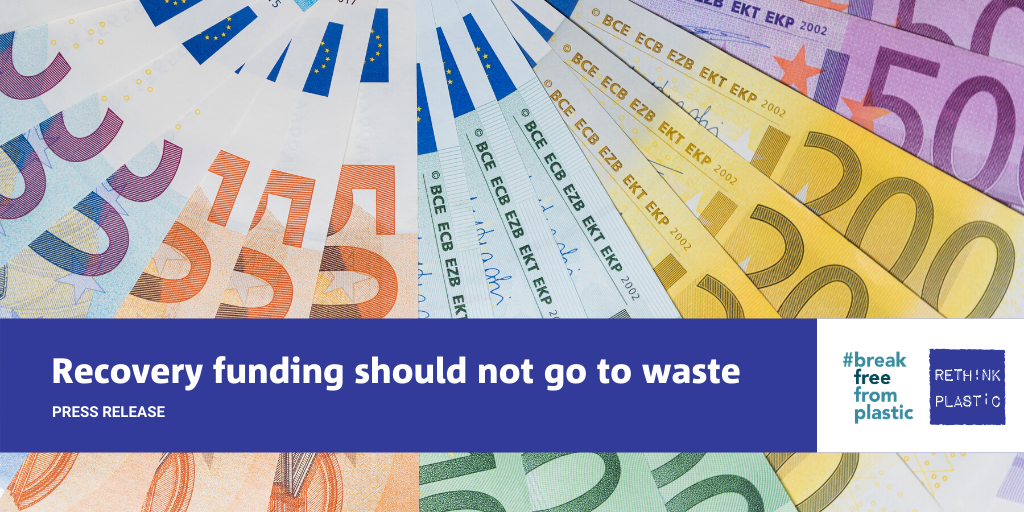Brussels, 19 June 2020 - Today, European Heads of State and Government are meeting to discuss the Recovery Plan for Europe proposed by the European Commission in May. Rethink Plastic calls on European decision-makers to ensure that recovery funding is used to speed-up the transition to a toxic-free circular economy in Europe, based on reducing our resource-use through waste prevention and reuse.
The recovery plan, composed of a 750 billion “Next Generation EU” support package and a revised €1.1 trillion 7 year budget (2021-2027) is drawing much attention, with everyone trying to get a piece of the pie. It carries the risk of becoming a horse-trade.
The plan should support fundamental systemic change rather than continue financing the same actors who are driving the current fragile and destructive system.
Clear green conditionality has to be attached to any recovery funding, using the EU Taxonomy criteria as a basis. In line with the European Green Deal’s oath: ‘do no harm’, any activity that causes significant harm to the achievement of health and environmental objectives (the transition to the circular economy, climate change mitigation and pollution minimisation) should be deemed unsustainable and as such not eligible for recovery funding.
Capital-intensive industries that cannot already function sustainably on their own or can only self-sustain by damaging our health and our environment, such as the petrochemicals and (single-use) plastic industry - should not be eligible for recovery funding.
Similarly, end-of-pipe waste management solutions such as incineration and plastic-to-fuels should be excluded. “EU leaders have a responsibility towards citizens to make sure that stimulus packages will support the shift to a toxic-free circular economy, the redesign of products, business models and systems, and support local and green jobs” says Delphine Lévi Alvarès, Coordinator of Break Free From Plastic Europe and the Rethink Plastic alliance.
Also, while Rethink Plastic welcomes the fact that taxing plastic is back on the table, it still regrets that the contribution applies to non-recycled plastic packaging.
“If taxation on plastic is to have a real impact on plastic proliferation and pollution, it should rather be set on virgin plastics resins to support reduction at source and bridge the price gap between recycled plastic and virgin plastic, the price of which has plummeted due to low oil prices” added Delphine Lévi Alvarès.
Several global (Fast Moving Consumer Good) companies, which have committed to integrate recycled content in their products, have recently expressed support for taxation of virgin plastic resins.
Putting people and the environment at the center of the recovery package is the only way to address the lack of resilience that the pandemic has brought to light and move forward.
Press Contacts
Agnese Marcon, Communications Coordinator, Rethink Plastic alliance
+32 (0) 456 078 038, news@rethinkplasticalliance.eu
Delphine Lévi Alvarès, Coordinator, Break Free From Plastic Europe and Rethink Plastic alliance,
+32 (4) 78 71 26 33, delphine@rethinkplasticalliance.eu
Rethink Plastic is an alliance of leading European NGOs, representing thousands of active groups, supporters and citizens in every EU Member State. It is part of the Break Free From Plastic movement.
Break Free From Plastic is a global movement envisioning a future free from plastic pollution. Since its launch in September 2016, nearly 1,900 organizations from across the world have joined the movement to demand massive reductions in single-use plastics and to push for lasting solutions to the plastic pollution crisis. These organisations share the common values of environmental protection and social justice, which guide their work at the community level and represent a global, unified vision.




